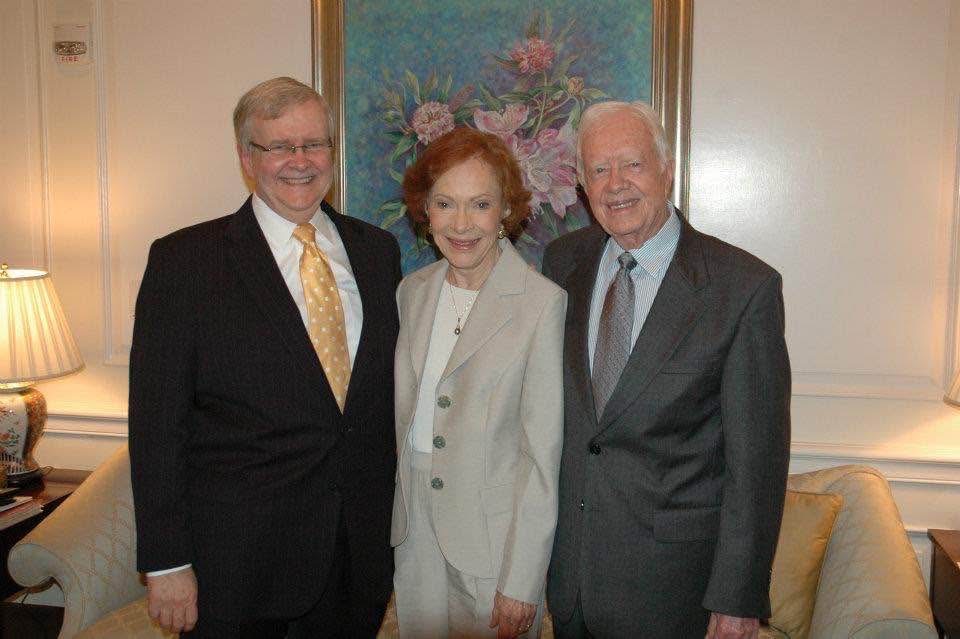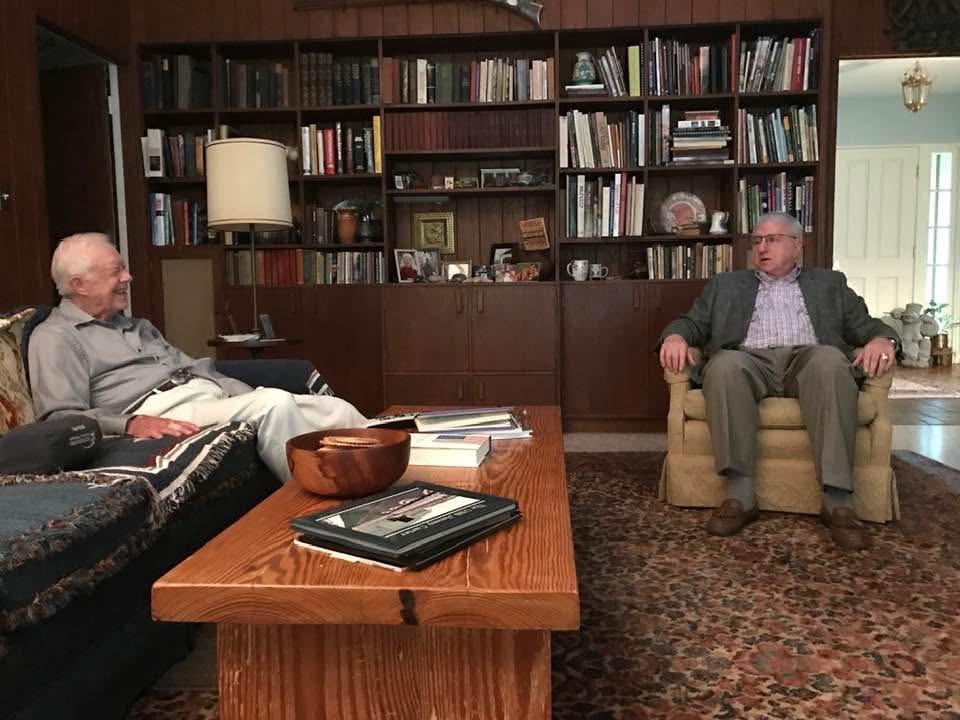Jimmy Carter, beloved Sunday school teacher, ex-president, dead at 100
(RNS)—Jimmy Carter, who died Sunday, Dec. 29, at age 100, was known most as the 39th president of the United States. But he also will be remembered as the world’s most famous Sunday school teacher.
Carter, who spoke openly about his Baptist faith while campaigning for the White House in 1976, earned the votes of many evangelical Christians when he called himself “born again.”
Carter died at his home in Plains, Ga., surrounded by family, according to a statement on The Carter Center website.
“My father was a hero, not only to me but to everyone who believes in peace, human rights, and unselfish love,” said his son Chip Carter in the statement. “My brothers, sister, and I shared him with the rest of the world through these common beliefs.”

After leaving the White House in 1981, Carter spent decades as a humanitarian and advocate for peace—building houses with Habitat for Humanity, monitoring elections in dozens of countries, helping fight against Guinea worm disease.
Still, more Sundays than not, the former president had a regular appointment: teaching Sunday school in his rural Georgia Baptist church, Maranatha Baptist Church.
His wife of 77 years, Rosalynn Carter, died at the age of 96 on Nov. 19, 2023.
“Jimmy Carter’s identity is inseparable from his almost lifelong vocation—60, 70 years—as a Sunday school teacher,” said historian Bill Leonard, professor of divinity emeritus at Wake Forest University School of Divinity. “He has lived every week of his adult life in the study and teaching of the Scriptures.”
Only US president to teach Sunday school while in office
Carter was the only U.S. president to have taught Sunday school while in office, according to the White House Historical Association. William McKinley and Theodore Roosevelt taught Sunday school before entering the White House, and Benjamin Harrison led a Bible study class after his presidency at First Presbyterian Church in Indianapolis.
Carter, a Nobel Peace Prize winner, spoke matter-of-factly about his long-term Bible teaching in a 2014 appearance at the LBJ Presidential Library.
“I belong to Maranatha Baptist Church and that’s where I teach Sunday school every Sunday—last Sunday and this next Sunday as well—about 35 times a year,” he said.
“I had been teaching Bible lessons since I was a midshipman in Annapolis, 18 years old.”
His practical lessons attracted hundreds to his rural Georgia church on a Sunday as he related the verses of the Bible to the challenges of modern times.
“What I try to do each Sunday is begin my lesson for about 10 or 15 minutes discussing current events, the recent experiences that I have had or where I’m going next week,” he told Religion News Service, in 2011. “And then seeing how that applies to biblical principles, basic moral values that apply to every human life.”
Through the Year with Jimmy Carter: 366 Daily Meditations from the 39th President, published that year, featured summaries of the 45-minute lessons he taught over the years, including at First Baptist Church in Washington when he was in the White House in the 1970s.
Born Oct. 1, 1924, in Plains, Carter graduated from the U.S. Naval Academy in 1946 and served as a naval officer until 1953, including duty aboard the USS Pomfret, a submarine, according to his biography on the Carter Presidential Library website. He retired from active duty after the death of his father.
He returned to Georgia with his wife—whom he married the same year he earned his naval commission—and took over the family farm supply business. He also began a steady rise in Georgia politics, serving in several local roles before being elected to the Georgia Senate and moving to the governor’s mansion in 1971.
Five years later, he was elected the president. Abandoned by evangelical voters—who objected to his liberal stands on some issues—and dogged by a poor economy and the Iranian hostage crisis, he lost his bid for reelection in 1980 to Ronald Reagan. With Reagan’s election, the evangelical Christian bloc moved to the Republican Party.
Throughout Carter’s political career, he remained active in local church life.
Break with SBC

He eventually would make a public break with the Southern Baptist Convention after the denomination revised its statement of faith to call for women to submit to their husbands and banning women from serving as pastors. Still, he continued to attend Maranatha Baptist, which is affiliated with the Cooperative Baptist Fellowship.
Despite their significant theological disagreements, leaders of Carter’s former denomination admired his commitment to the teaching of Scripture.
“History will record that no president of the United States demonstrated a greater long-term commitment to identifying with the Christian faith and with even the teaching of the Bible than Jimmy Carter,” said R. Albert Mohler Jr., president of the Southern Baptist Theological Seminary in Louisville, Ky., in a 2019 interview.
The small Plains church, which seats 300, drew its largest crowd to see Carter—878—in the 2000s. That’s more than the town’s population.
On such occasions, there was overflow seating in a fellowship hall.
“We stacked them wherever we could put ’em,” Maranatha member Jan Williams recalled of the day when nine motorcoaches arrived with the record number of attendees and some only heard audio piped into rooms outside the sanctuary. “Some of ’em just heard him. They didn’t see his face until after church.”
Maranatha members sometimes added chairs to the choir loft.
“People want this opportunity, and you don’t want to send them away,” Williams said.
Though the curious came to see him, Williams said Carter’s intention was that they leave with more than a photo with the former first couple.
“This has been part of his identity,” said Randall Balmer, author of Redeemer: The Life of Jimmy Carter. “He’s very proud of this. He numbers all of his lessons, so he knows how many he taught.”
Steven Hochman, who served as assistant to Carter and director of research at the Carter Center, said in 2019 that the former president had taught more than 2,000 Sunday school lessons.
Tony Lowden, former pastor of Maranatha Baptist Church, told Religion News Service in June 2022 that Carter was no longer attending in person at that time, but “I bring church to him,” ministering to the former president and his wife during the week.
“He’s more than Sunday school,” Lowden added. “His walk is every day with the Lord.”
BWA mourns his loss

In a release, the Baptist World Alliance spoke of Carter’s “long history of involvement with the Baptist World Alliance” and “his remarkable work for justice and peace around the world.”
He served as Honorary Chair of the BWA’s Special Commission of Baptists Against Racism in 1992, and he was the recipient of the first BWA Congress Quinquennial Human Rights Award in 1995.
Former BWA General Secretary Denton Lotz presented the award to Carter during the Baptist World Congress in Buenos Aires, Argentina, “in recognition of his outstanding contributions to the cause of human rights around the world and his commitment to Christian peace and justice.”
In his acceptance speech, Carter noted: “I’m proud to be part of the BWA—one hundred million men and women around the world who don’t let political values separate us from one another. We see ourselves as brothers and sisters, regardless of our ethnic or racial differences, our political philosophies. We are joined together in a common faith, and I’m proud to be a part of it.”
“On behalf of the BWA, we give thanks for the life of President Carter and his tireless work for human rights around the globe,” Elijah Brown, BWA General Secretary and CEO, noted in a statement on his passing. “Carter was a living embodiment that politics is not the pinnacle of public service.
“As a believer in the Baptist tradition, his faith was a call to all of us to remain deeply rooted in a local church community while working for peace and serving our neighbors with the good that each one of us can do.”
Brown concluded, “We hold the Carter family in our prayers, and we commit to honor the legacy of our brother in Christ by continuing our work for human rights and religious freedom worldwide.”
With additional reporting by Calli Keener.